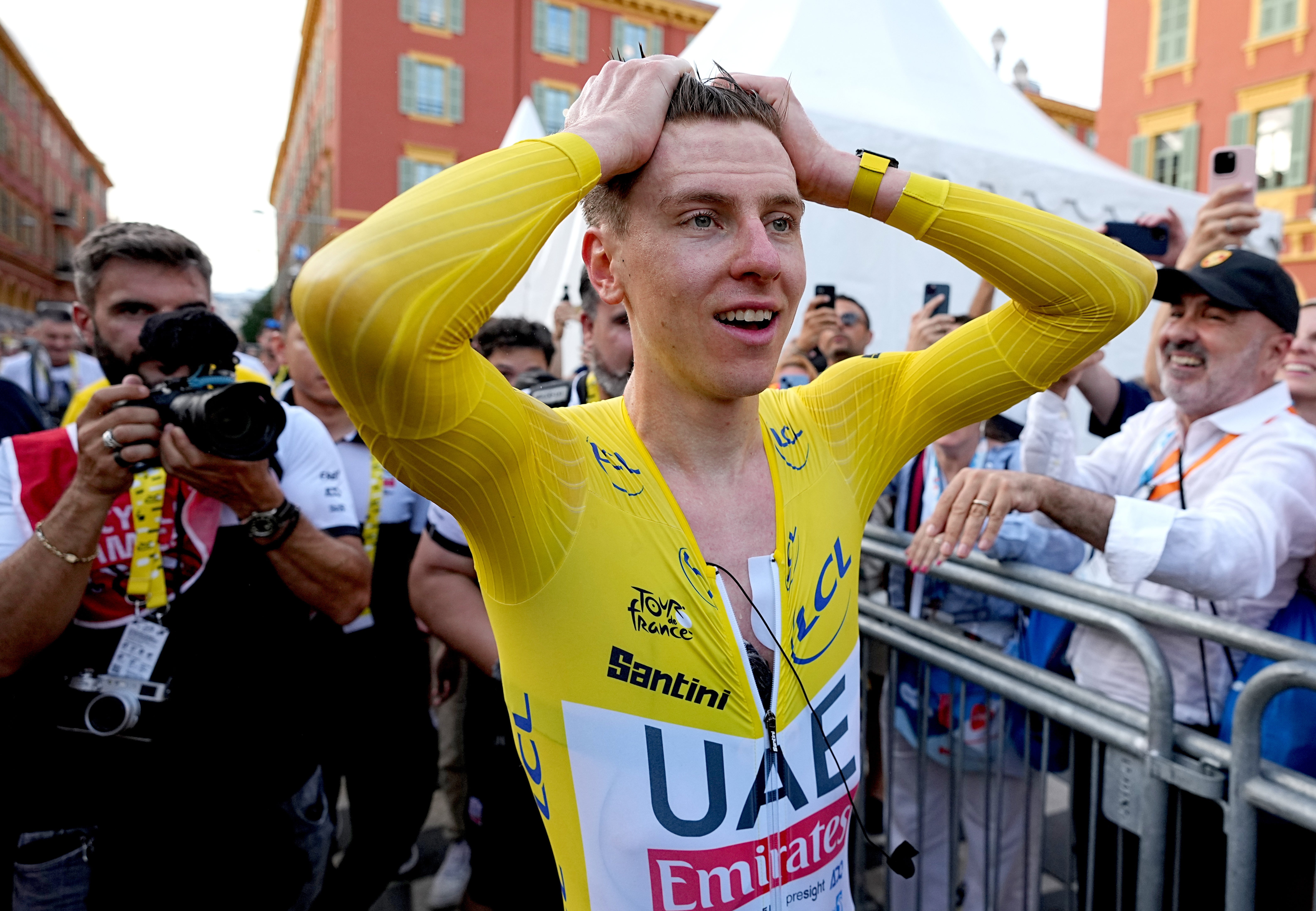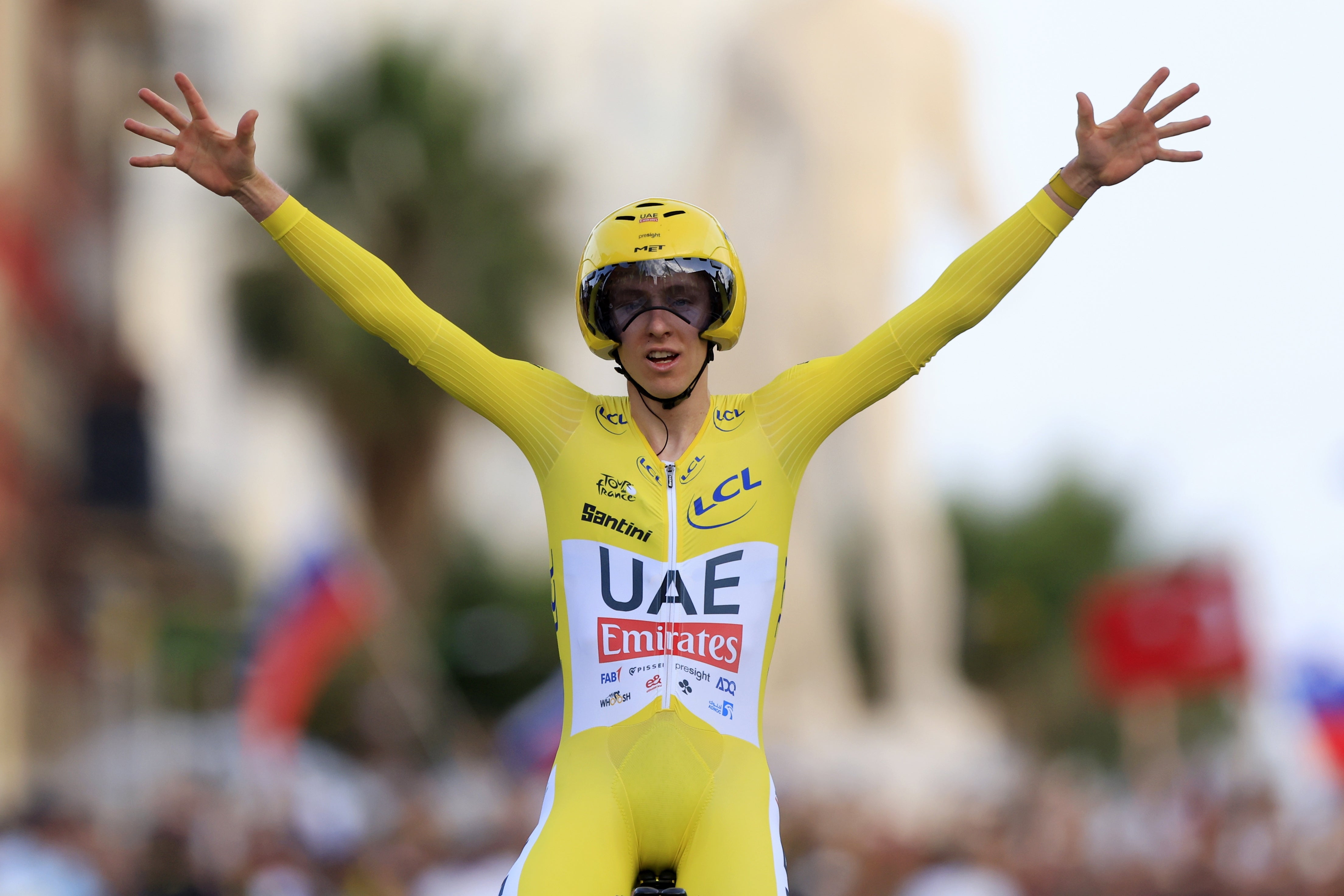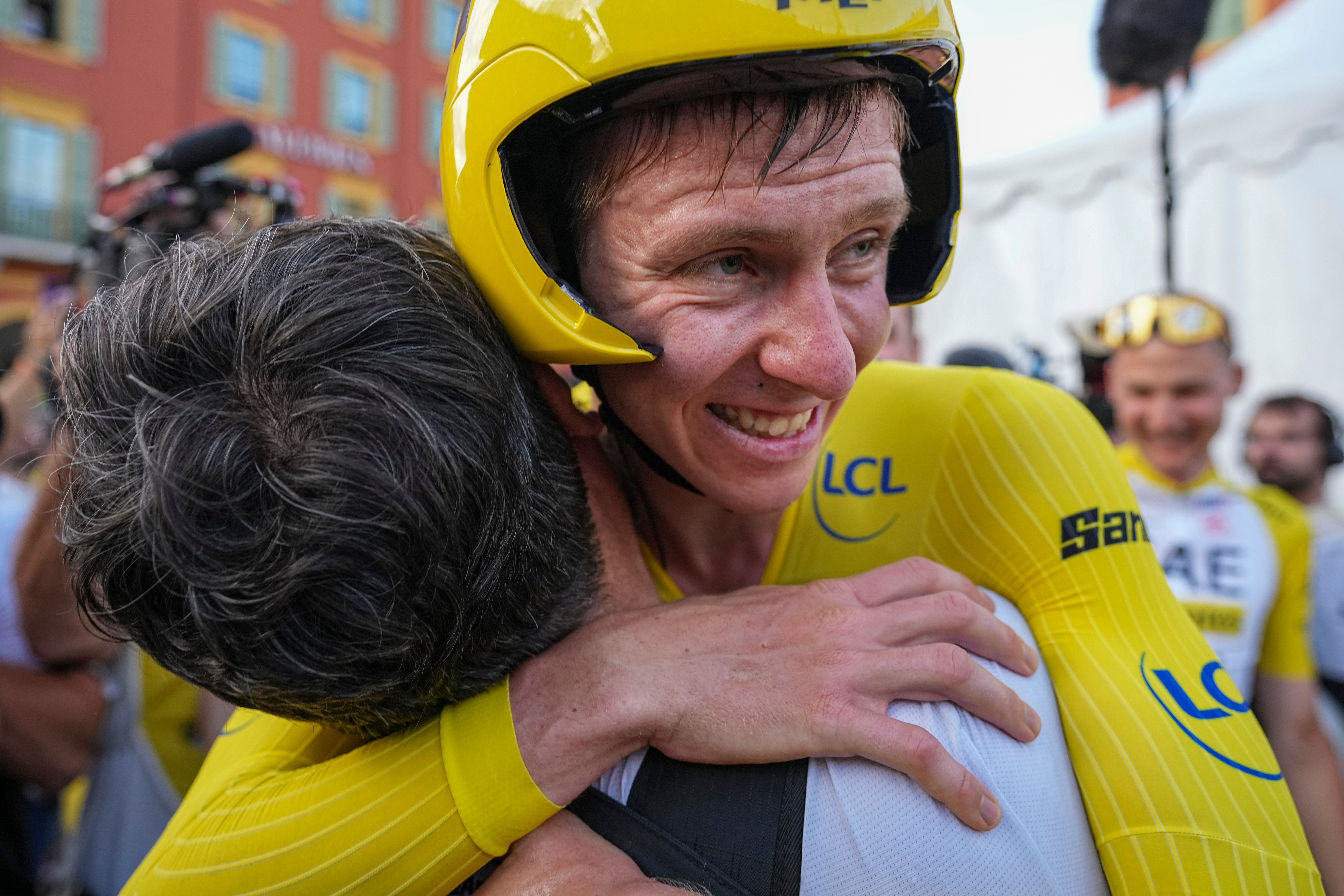Giro, Tour de France, Worlds... Can Tadej Pogacar complete one of the greatest seasons in cycling history?
Pogacar dominated the stage 21 time-trial finale just because he could and stands on the brink of one of the greatest seasons in the history of road racing

Your support helps us to tell the story
From reproductive rights to climate change to Big Tech, The Independent is on the ground when the story is developing. Whether it's investigating the financials of Elon Musk's pro-Trump PAC or producing our latest documentary, 'The A Word', which shines a light on the American women fighting for reproductive rights, we know how important it is to parse out the facts from the messaging.
At such a critical moment in US history, we need reporters on the ground. Your donation allows us to keep sending journalists to speak to both sides of the story.
The Independent is trusted by Americans across the entire political spectrum. And unlike many other quality news outlets, we choose not to lock Americans out of our reporting and analysis with paywalls. We believe quality journalism should be available to everyone, paid for by those who can afford it.
Your support makes all the difference.They say the hallmark of a champion is to perform when it matters most, when the pressure is highest, so what does that make Tadej Pogacar? A sadist, perhaps. On Sunday, with the yellow jersey already sewn up, with nothing to gain and everything to lose, he stormed to an otherworldly time-trial victory on stage 21, just because he could.
He had spent most of the past three weeks tearing the peloton to shreds, launching vicious attacks which splintered the chasing pack, each surge like a grenade thrown into the bunch. On this final ride, a 34km time-trial from Monaco to Nice, he fired one more, crushing not only his nearest rival Jonas Vingegaard but the time-trial world champion Remco Evenepoel too. Only in the last few metres of this 3,498km race did he let up, raising two hands to the sky as he crossed the line.
The Tour de France can be won in myriad ways. Geraint Thomas eked out seconds at opportune moments, gradually growing his gap. Chris Froome controlled every aspect of the race from inside his bunker of Sky domestiques. Here, Pogacar bullied the peloton from pillar to post, grabbing the yellow jersey on stage two, taking his first win on stage four and then obliterating his rivals on stages 14, 15, 19, 20 and again on 21.
His haul of six stages is the most of any Tour de France winner since Bernard Hinault in 1979. Aged 25, he has three yellow jerseys and is in the midst of a season from the gods, completing the first Tour-Giro d’Italia double this century. After losing to Vingegaard in 2022 and 2023, Pogacar has never looked stronger, reaching levels perhaps no modern-day rider ever has.
“Already it would have been an incredible year, but to win the Tour de France is another level,” an emotional Pogacar said at the finish. “I cannot describe how happy I am. After two hard years in the Tour de France, this year everything went to perfection. This is the first grand tour where I was totally confident every day. Even in Giro I had one bad day but I won’t tell which one. This Tour de France was amazing. I was enjoying day one until today.”

The lasting images of this Tour will feature his explosive surge to the Plateau de Beille summit on stage 15’s Bastille Day, and his breathtaking assault on the final 16km ascent to the summit finish to win stage 19, hunting down the strong American climber Matteo Jorgenson who had a four-minute head start.
His rivals have been taken aback. Jorgenson looked like he’d survived a tsunami. “I heard Pogacar was coming. We were trying to keep as big a gap as possible because when Tadej launches...” he trailed off.
“He’s not the same as us,” said Evenepoel, who fought gamely to finish third overall.
Pogacar’s teammate Joao Almeida said “it’s unbelievable how strong he is” and their manager at UAE Emirates, Matxin Fernandez, called him “the best rider I have ever seen”.
Pogacar has himself hailed what he called “the highest numbers I ever did in my career”, most notably that Plateau de Beille climb ridden at an estimated 6.98 watts per kilogram, which is like the average club rider sprinting full out, eyes popping. They might keep it up for 40 seconds; Pogacar did it for 40 minutes.
As with every Tour de France champion, great performances bring scrutiny as well as acclaim. The credibility question came into focus in the final week of the Tour after an investigation by Escape Collective revealed how elite teams are using controversial carbon monoxide rebreathing equipment in altitude training camps. The equipment can be used for performance enhancement, but the three teams asked – Visma, UAE Emirates and Israel Premier Tech – insist they use it only for measuring purposes. It is not specifically banned by the World Anti-Doping Agency.
Initially Pogacar did not answer with great conviction, first saying he didn’t know anything about the equipment before later explaining that it was used only to measure training performance and not to enhance it. Vingegaard gave a similar response.
“There will always be doubts,” Pogacar said on Sunday. “Because of cycling before my time, in any sport, if someone is winning, there’s always jealousy and haters ... I tell you now, it’s not worth it. Taking anything to risk your health is stupid.”
The bare facts are that Pogacar is one of the most tested athletes on the planet, and that he has not become a phenomenal athlete overnight. He would point to some significant changes made this season, switching coach, increasing heat training and dedicating himself to riding the immaculate time-trial, efforts which are clearly bearing fruit. Unlike Vingegaard, an injury-free year has created near perfect conditions.

It is tempting to wonder what sort of thrilling battle this race might have thrown up had Vingegaard not crashed so horribly in the Basque Country in April. He sustained a punctured lung, broke several ribs and a collarbone which required surgery, and his team said he would only go to the Tour if he was “100 per cent”.
Vingegaard was surprisingly close to his best, sticking with Pogacar on stage two and out-gunning him on stage 11 for a clever, defiant win. But this was not quite the Vingegaard who won the Tour so convincingly 12 months ago, and he finished six minutes off the pace.
Yet even a supreme Vingegaard may have struggled to close the gap. Pogacar is in the form of life. Before the Giro, he had already won Liege-Bastogne-Liege, Strade Bianche and the Volta a Catalunya. The only major race Pogacar has started and failed to win this year is Milan-San Remo, where he finished third.
There is still the World Championships in September, with more time for recovery after pulling out of the Olympic road race, and if he succeeds then it is legitimate to start placing his season among the greatest in the history of road cycling. Eddy Merckx’s 1972 is often referred to as the pinnacle, a year in which he won three Monuments, the Giro-Tour double and set a new Hour Record. If Pogacar was to complete the Giro-Tour-World triple crown, it would certainly come close.
“Next I want to take the World Championship jersey,” he said. “It has looked very good on Mathieu van der Poel. I want one time to have the rainbow jersey on my back.”
Join our commenting forum
Join thought-provoking conversations, follow other Independent readers and see their replies
Comments